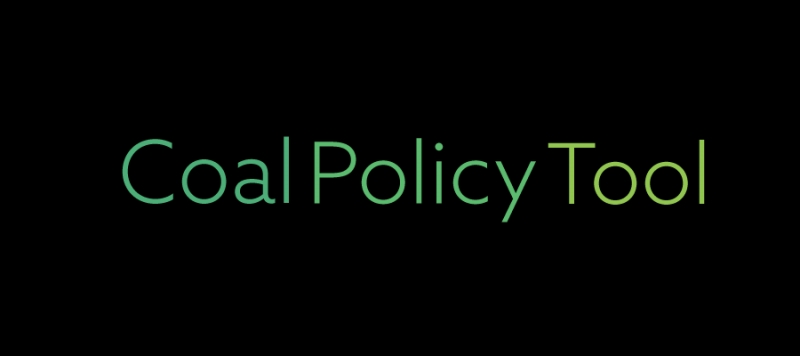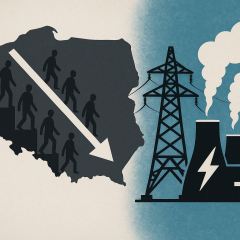Climate finance experts have revealed the major loopholes in hundreds of financial institutions' coal policies which they say could lead to the expansion of the coal industry and prevent the world from exiting coal on time if left unchecked. They also expose the banks, insurers, asset owners and asset managers with no restrictions on coal at all.
Paris, September 8th, 2020, 09:00 CET - Reclaim Finance, in partnership with 26 other NGOs [1], is releasing the first online tool to identify, assess, and compare the policies adopted by financial institutions worldwide to restrict or end their financial services to the coal sector [2]. The Coal Policy Tool rates the coal sector policies of 214 financial institutions on a consistent and transparent scoring grid built upon five key criteria; it also names the largest banks, re/insurers, asset owners and asset managers that have not begun taking steps on the coal policy road [3]. The tool, which will be updated in real-time, spans 30 countries, from Australia to the United States. The Coal Policy Tool helps users to easily identify the good, the bad, and the in-between of policies adopted by financial institutions worldwide.
The number of coal policies has been growing fast since the adoption of the Paris Agreement in 2015. The Coal Policy Tool is the most comprehensive database assessing the quality of existing policies against the goal of keeping global warming below 1.5 degrees Celsius above pre-industrial levels. In a snapshot, the tool shows that:
- The best policies are in Europe, where one can find the highest number of financial institutions adopting policies on coal and reviewing them regularly to adopt higher standards.
- US asset managers, which dominate the market worldwide, are among the worst performers. BlackRock is the only US asset manager with a policy on coal. However, Blackrock’s January 2020 announcement was largely theatrical as its policy scored 0 on all but one of the Coal Policy Tool criteria.
- Except for French banks which have recently adopted policies to exit the coal sector, banks are globally lagging behind re/insurers, with a relatively higher number of re/insurers having adopted appreciable restrictive exclusion criteria at the corporate level.
Quality is, however, still a major issue. According to the Coal Policy Tool’s analysis, only 16 financial institutions, including top players such as AXA, Crédit Agricole/Amundi, Crédit Mutuel and UniCredit have a robust coal phase-out policy [4]. Most coal policies around the world remain too weak to even prevent further growth of the coal sector.
“The tool goes beyond identifying and comparing policies and enabling clients, media, financial institutions, and other stakeholders to navigate the coal policy jungle easily. Above all, it aims to ensure high-quality coal policies that effectively contribute to preventing climate chaos,” says Lucie Pinson, Founder and Executive Director of Reclaim Finance.
Pinson adds: “It is not enough to adopt a policy, what we need are good coal policies. French financial institutions were the first global players that adopted policies on coal, but these policies had to be amended many times before they became sufficiently robust to support a coal exit. We cannot afford to continue delaying real action. Addressing oil and gas is increasingly pressing; financial institutions need to now urgently progress to the level of the highest quality coal policies identified by our tool.”
What makes a coal policy strong?
To perfectly align with climate science, a coal policy needs to (a) cover the entire value chain, from mining to power through infrastructure; (b) tackle all financial services, including corporate and project financing, underwriting, and passive fund management, and (c) combine exclusion criteria and shareholder engagement to not only prevent the expansion of the coal sector but to also support its rapid phase-out.
- Preventing new coal projects from being built is of the utmost urgency to have a chance at limiting global warming below the 1.5ºC target set forth in the Paris Climate Agreement: Financial institutions must immediately end all services at the project level, but also all general corporate support to companies with coal expansion plans.
- All existing coal assets must progressively be shut down, and not sold: Financial institutions must commit to bringing their coal exposure to zero by 2030 in Europe and OECD countries and by 2040 in other countries at the latest. Achieving these goals requires the immediate exclusion of companies highly exposed to coal - either because a large share of their activities is based on coal or because the sheer size of their coal activities is significant [5]- as well as a robust engagement strategy requiring companies to adopt a coal phase-out plan.
Most banks and insurers still support new coal projects
216 top financial institutions [3] continue to lack any policy on coal, and most banks and insurers allow direct financing or insurance coverage for new coal projects. This is the case for the UK insurance market Lloyd’s, the US insurers AIG and Liberty Mutual, the Chinese bank ICBC and the Polish insurer PZU, which do not exclude any new coal projects. Many other financial institutions only exclude some of the worst projects. All geographies are concerned even if US, South Africa, and Asian financial players dominate the picture.
Existing policies are insufficient to mitigate the impacts of the coal sector
50 banks and insurers analysed in the tool still do not exclude any coal companies from financial services and just exclude financial services on the project level. And most exclusions of coal companies are based only on the relative share of coal in their activities. As revealed by the Global Coal Exit List, a database maintained by the NGO Urgewald, this approach leads to policies that let some of the biggest coal producers or coal plant developers off the hook.
Most financial institutions fail addressing the need to exit coal
And last, but not least, the Coal Policy Tool shows that nearly everything remains to be done to support the closure of existing coal assets on time to align with climate science. Only an exceedingly small number of financial institutions have started to (a) commit to reducing their exposure to the coal sector to close to zero at the latest by 2030 in Europe and OECD countries and by 2040 in other countries at the latest and (b) adopt a strategy to meet this target. Many French financial groups are now requiring that their remaining clients adopt a coal phase-out plan by the end of 2021 and have pledged to drop clients who are unable to prove their ability to exit coal in a timely and orderly manner.
Notes
[1] The Coal Policy Tool is launched in partnership with the following NGOs:
350; BankTrack; Both Ends; Centre for Financial Accountability; CEED - Center for Energy, Ecology, and Development; CLEAN; Ecologistas en Acción ; Fossil Free California; Fundacja ”Rozwój TAK - Odkrywki NIE”; Friends of the Earth US; Global Witness; Instituto Internacional de Derecho y Medio Ambiente; Jacses; Just Share; Kiko Network, Les Amis de la Terre France; Maan ystävät - Friends of the Earth Finland; Rainforest Action Network; Re:Common; RESET; ShareAction; Solutions For Our Climate; Sierra Club; Urgewald.
The NGO campaigns Insure Our Future and BlackRock’s Big Problem also endorse the tool.
[2] The Coal Policy Tool is accessible at https://coalpolicytool.org/
[3] The Coal Policy Tool covers:
- The top 20 banks/asset owners/asset managers in global rankings (Standard & Poor’s for banks, Willis Towers Watson plc for asset owners and asset managers), and insurers covered in the 2019 Scorecard on Insurance (Insure Our Future), whether they have a coal policy, or not;
- All financial institutions in the top 100 of those rankings, which were assessed systematically, for which Reclaim Finance could find a coal policy;
- Some other smaller financial institutions above a minimum threshold of 10 billion USD of assets for which Reclaim Finance could find a coal policy through research and from partners worldwide, without conducting a systematic assessment, and
- Some other financial institutions added at the request of our partners.
More information on this methodology is available on this webpage.
It rates the policies of 214 financial institutions. The number of 214 is found once duplicates have been removed as insurers are graded both for their insurance as well as their investment policies.
Reclaim Finance found that 216 top financial institutions have no coal policies. The number of 216 refers to financial institutions in the top 100 global rankings mentioned above of banks (Standard & Poor’s), asset owners and asset managers (Willis Towers Watson plc), and insurers in the 2019 Scorecard on Insurance (Insure Our Future) once removing duplicates. It is important to note that only the largest financial institutions with no coal policy were integrated in the Coal Policy Tool.
[4] The 16 financial institutions with a robust coal phase-out policy are part of the following 10 financial groups: the top players AXA, Crédit Agricole/Amundi, Crédit Mutuel, and UniCredit along with 6 other French financial groups: AG2R La Mondiale, CNP Assurances, La Banque Postale Asset Management, MACIF, OFI Asset Management and SCOR in its capacity as an investor (the reinsurer SCOR has a minimal coal policy that only ends facultative coverage at project level).
[5] Reclaim Finance and its partners call on financial institutions to exclude all companies generating more than 20% of their revenues or 20% of their power production from coal as well as companies that produce more than 10 million tons of coal a year or have more than 5 GW of coal power production capacity. More information is available on this webpage.
The Coal Policy Tool
Selected facts about the best and the worst of coal policies
Our selection of the three worst hot air policies
- Stopping direct financing to new coal plants while maintaining massive financing to companies building these projects: JPMorgan Chase scored 8 out of 10 on the first criteria about support at project level thanks to its February 2020 commitment to no longer allow project financing to new coal plants worldwide - hardly significant news considering JPMorgan only provided primary project financing to two new coal plants projects in the last 20 years according to the international financial database IJGlobal. However, JPMorgan Chase scored 0 on the second criteria about financial services to coal developers. The US bank does not exclude any coal power company, which explains that it provided 21 companies planning new coal plants projects with $8.2 billion between January 2017 and 2019 Q3 according to NGO research.
- Excluding a minus part of the coal sector from a tiny portion of assets under management: There was a lot of show surrounding BlackRock’s coal policy announced in January 2020. However, BlackRock is scored 0 on all but one criteria applied by the Coal Policy Tool to asset managers. On the remaining criteria, BlackRock has the lowest possible score because its policy does not cover the whole coal value chain and is not applied to more than 70% of its assets under management. Consequently, its policy does affect only less than 20% of the 746 companies on Urgewald’s Global Coal Exit List.
- Pretending to exit coal while maintaining support to significant coal companies: Australian insurer QBE announced its commitment to phase out insurance for the thermal coal industry by 2030. In fact, QBE will only exclude companies with more than 30% of revenue or 30% of power generation from thermal coal after 2030. A real coal phase-out requires targeting no exposure to companies with more than 5% of their activities in the coal sector as well as a full exclusion of companies with coal expansion plans.
Our selection of the best practices
- Ending financial support to all coal projects: Natixis
To date, 42 banks and insurers have ended financing for new thermal coal mines and plants. Natixis has gone above and beyond, also ending financial support to new coal infrastructure projects, such as new coal export-import terminals, and to retrofits extending coal plants’ lifespans. Only 8 other financial institutions have taken these additional measures.
Another critical issue in the timely phase-out of coal power is the choice made by some companies to sell existing thermal coal plants rather than close them—only the closure of coal plants decreases the overall emissions caused by coal. This issue is particularly salient in Europe, where big European utility companies, including Engie, have sold several coal plants to the Czech power company EPH (Energetický a průmyslový holding, a.s.). Natixis explicitly excludes all financing for the acquisition of coal mines, coal plants, and coal related infrastructure.
- Excluding almost all coal developers: Crédit Agricole
The litmus test of financial institutions’ seriousness in tackling the human and climate impacts of the coal sector is whether a coal policy excludes companies with plans to build new thermal coal mines, plants, or infrastructure such as terminals.
No financial institutions have committed to excluding companies selling equipment for new coal projects but the Crédit Agricole group is the one that has gone the further. The group is comprised of a banking arm, an insurance division, and asset management giant Amundi. It excludes all companies developing new coal assets and is one of the few financial institutions to also exclude companies purchasing existing coal assets without pledging to shut them down by their planned end of life by 2030 in EU/OECD countries and 2040 worldwide.
- Adopting a very stringent relative exclusion criteria: Storebrand
Storebrand excludes companies deriving more than 5% of their revenues from coal. While Storebrand uses the wrong metric to assess the share of coal in the total activities of power producers, this 5% threshold is far more ambitious than that demanded by NGOs. Reclaim Finance and its partners currently demand that financial institutions (1) exclude companies generating more than 20% of their revenues or electricity generation from coal and (2) commit to reduce the threshold to zero at the latest by 2030 for Europe and OECD countries and by 2040 in other countries. To date, 23 financial institutions have adopted a threshold equal or less than 20%, but few have committed to lower the threshold over time.
In 2018, Storebrand committed to regularly lowering its 25% exclusion threshold to fully exit coal by 2026. However, in 2020, Storebrand decided to accelerate its coal phase-out and adopted a 5% exclusion threshold.
- Adopting a very stringent absolute exclusion: Crédit Mutuel
The vast majority of the 175 financial institutions restricting their financial services to coal companies only exclude companies based on the relative share of activities related to coal. This approach allows financial institutions to protect themselves from coal-related financial risks but ignores the climate impact of their financial services to the coal sector. Indeed, a relative exclusion threshold let diversified companies off the hook even if the size of their coal operations puts them among the top coal plant operators and top coal producers.
The Crédit Mutuel group is comprised of a banking arm, an insurance division, and an asset management branch. Crédit Mutuel is the first financial institution to adopt very ambitious absolute exclusion thresholds on both coal mining and coal power and to apply it to all its financial services. The group excludes companies mining more than 10 Mt of coal per year and companies with more than 5 GW of coal power capacity.
- Actively supporting a just coal phase-out: La Banque Postale AM
Many investors praise the corporate engagement process to justify the absence of exclusion criteria, but engagement proceedings are not transparent and rarely have clear deadlines or consequences in the event of failure.
As of now, 19 financial institutions are now requesting companies publish a plan to phase out coal at the latest by 2030 in Europe and OECD countries and 2040 worldwide. 7 financial institutions have made the adoption of such plan a mandatory requirement to continue their financing/investments. Few require companies close, rather than sell their assets and pay attention to its social impacts; La Banque Postale AM is the only one to make this requirement immediate.
Country with the worst track record: China
So far, only one Chinese financial institution has adopted a coal policy—Ping An; this policy is very weak and, scores only one out of ten for the project criteria as it only excludes a tiny number of coal projects. This explains why Chinese banks have played a major role in fostering coal expansion in China and around the world; many of them are involved either in the direct financing of coal projects or indirectly by financing of many coal developers worldwide.
Country with the best track record: France
France is the country with the highest number of coal policies and high-quality policies. Italian UniCredit is the only non-French financial institution among the 16 to have adopted a high-quality coal policy. It took countless revisions for French financial institutions to reach this stage and many French financial players still have a long way to go. Financial institutions and the government have been under constant pressure from NGOs. NGO pressure finally led the government to encourage the professional federations of the finance sectors to make their members commit to publishing a coal exit plan by mid 2020. This explains the flurry of new policies adopted over the past few months. Still, the benchmarks for high-quality coal policies are set by NGOs.
To date, many French financial institutions are still far behind global players such as AXA or Crédit/Amundi which adopted the hallmarks of a high-quality coal policy in the past year. Many French financial institutions continue to have ineffective policies (SCOR reinsurance, Rothschild & Co., Covéa) while others have entirely failed to adopt a coal exit policy (ODDO BHF AM, La Française).
While BNP Paribas has committed to excluding companies that have not adopted a plan to exit coal by Paris-aligned deadlines, implementation risks remain; this is especially the case with regards to diversified holdings such as Glencore.
Which groups are not named in this press release but deserve a dishonourable mention for not having a coal policy at any level?
Abu Dhabi Investment Authority; Agricultural Bank of China; Bank of China; Berkshire Hathaway; BNY Mellon IM; Canada Pension; Capital Group; Central Provident Fund; China Construction Bank; China Investment Corporation; Federal Retirement Thrift Investment Board; Fidelity; GIC Private Limited; Government Pension Investment Fund (GPIF); Hong Kong Monetary Authority Investment Portfolio; Japan Post Bank; Keva; Kuwait Investment Authority; National Pension (South Korea); National Social Security China; Northern Trust; Pekao; Postal Savings Bank of China; Prudential Financial; Public Investment Fund/Sanabil Investments; Qatar Investment Authority; SAFE Investment Company; SAMA Foreign Holdings; Samsung FM; Sinosure; State Street; T. Rowe Price; Temasek; TIAA Family; Vanguard; Wellington Management.








